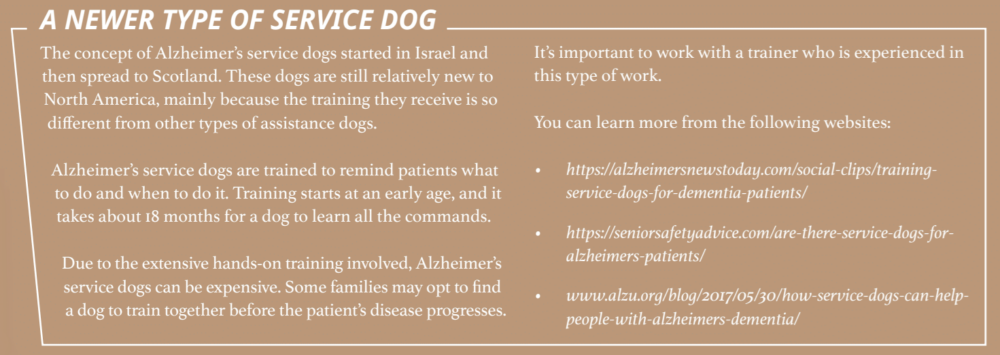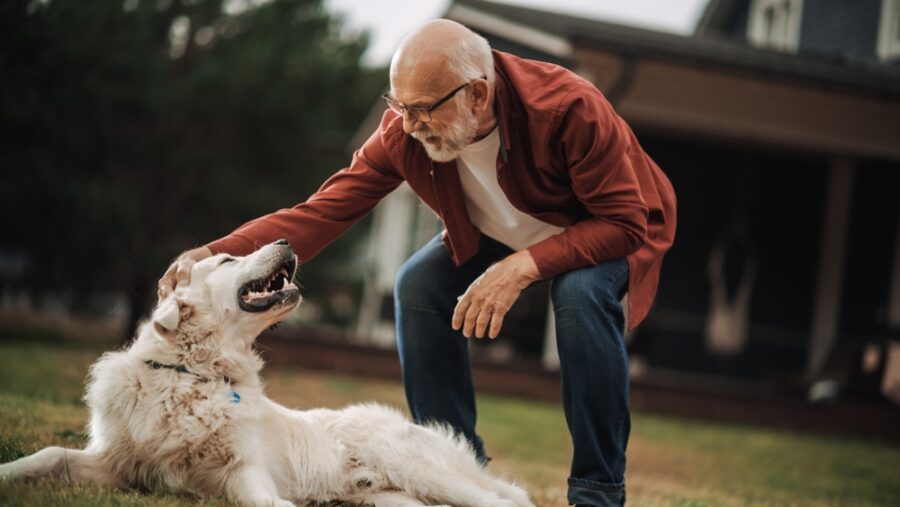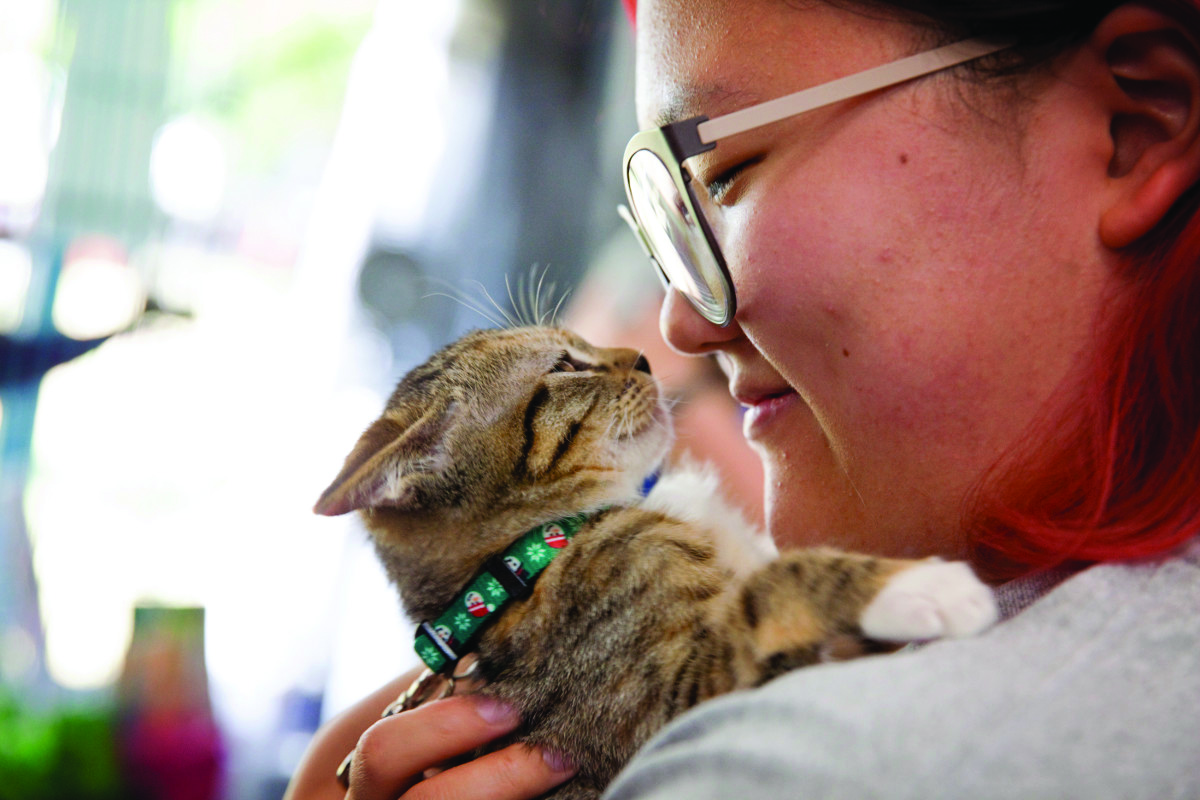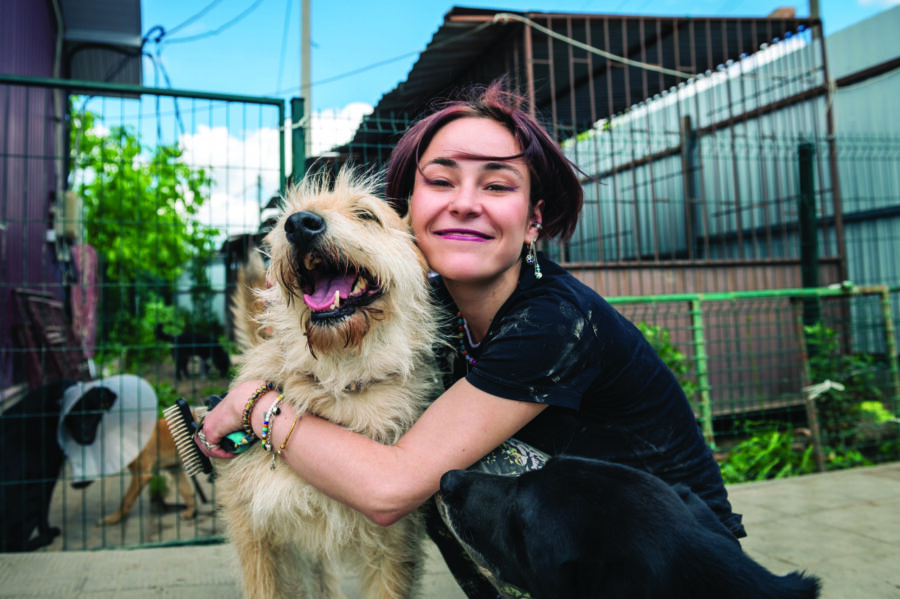Alzheimers service dogs are a relatively new concept, but they can make a positive difference to the lives of people diagnosed with this devastating disease.
Alzheimers is a terrible disease that affects many of our seniors. In the US alone, according to the Alzheimers Association, more than six million people are living with this dreaded disease. Short-term memory loss, confusion, and an inability to navigate familiar surroundings are some of the signs. This progressive condition is extremely stressful for both patients and their caregivers. However, service dogs working alongside human caregivers are playing an important role in the lives of Alzheimers sufferers by helping improve their quality of life and doing simple tasks for them.
WHAT DO ALZHEIMERS SERVICE DOGS DO?
Provide reminders to patients
Most dogs love jobs and can be trained to perform a number of chores, which makes them good candidates for helping people with memory issues. For someone in the earlier stages of the disease, an Alzheimers service dog can let her know when shes left the oven on, for example.
Dogs also have a keen sense of time, which is very helpful for Alzheimers patients who often get confused about what time it is. If dinner is at 5:30, the dog will be at his bowl at 5:30 on the dot, reminding his person that its time to eat. This can subsequently remind her to eat her own dinner as well. A service dog can also let his person know when its time to take her medications. A signal from the dog to fill his water bowl can remind her to stay hydrated too, while brushing his coat or wiping his mouth after eating is a cue for the person to also comb her hair and wash her face.
Help patients find their way
An Alzheimers service dog can also help guide the patient through her environment, both indoors and out. Unlike guide dogs, which are trained to walk beside vision-impaired people to help them navigate the world, Alzheimers service dogs lead the way. A longer leash is used so the dog can walk in front of his person rather than directly by her side.
These dogs are trained to help people find their way around if they get confused or disoriented while out on a walk. By using the command home, the patient prompts the dog to find their way back, even if theyve deviated from their usual route. In addition, a GPS collar allows a spouse or caregiver to track the pair if theyre late coming back. It can also be activated to make a sound the dog will be trained to interpret as come home. If theres a problem such as serious agitation or a fall, the dog will bark for help.
Offer emotional calming and support
- Many Alzheimers patients can become agitated and upset, especially when theyre confused or disoriented. An Alzheimers service dog is trained to use behavior interruption to help their person refocus.
- Simply petting the dog can help calm agitation.
- Companionship plays a big role. Thoughts dont slip away as quickly once theyve been spoken aloud, so talking to the dog can help, even if he cant talk back.
- An Alzheimers service dog can help reduce isolation and loneliness while providing the patient with exercise, purpose, and socialization. A morning walk can become an interactive experience as other walkers stop to ask about the dogs name or breed. Also, when the dog is the center of attention in such a situation, it can give the patient a moment to collect her thoughts before responding to any questions. Alzheimers can cause thought-to-speech problems, so it can be difficult for patients to respond when someone asks a question or makes a comment.
Learning that a loved one has been diagnosed with Alzheimers is devastating. But service dogs especially trained to assist these patients with tasks, reminders and guidance can help improve their quality of life on several levels.
THE GIFT OF MEMORY
The following account shows how dogs can profoundly impact the lives of those with Alzheimers.
A woman took her husband to adult daycare so she could run some errands. When she returned to pick him up, she saw that a therapy group was visiting with their dogs.
Look, Bob, she said. Lets ask if you can pet them.
Oh, we already visited with Bob, said one of the volunteers. He told me what kind of dog you have, his name, and the tricks he knows. We had a nice talk.
The woman began to cry. Our dog passed away 20 years ago, she explained. Alzheimers has taken so much of Bob, I worried there was nothing left. If he remembers our dog, I know that somewhere deep inside, hes still there.









